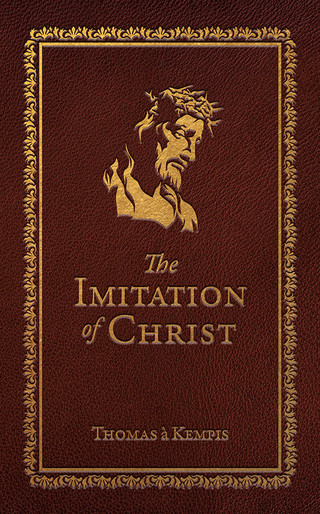Be guided by a master of the spiritual life with these useful admonitions. Excerpted from The Imitation of Christ, Thomas à Kempis here reveals wisdom to the soul seeking to advance in the interior life.
THE CONTEMPT OF ALL THE VANITIES OF THE WORLD
“HE THAT followeth me, walketh not in darkness,” saith Our Lord. (John 8:12). These are the words of Christ, by which we are admonished, that we must imitate His life and manners, if we would be truly enlightened, and delivered from all blindness of heart. Let it then be our chief study to meditate on the life of Jesus Christ.
2. The doctrine of Christ surpasseth all the doctrines of the saints, and whosoever hath the spirit will find therein a hidden manna. (Apoc. 2:17). But it happeneth that many, by frequent hearing of the Gospel, are very little affected: because they have not the spirit of Christ. But he who would fully and feelingly understand the words of Christ, must study to make his whole life conformable to that of Christ.
3. What doth it avail thee to discourse profoundly of the Trinity if thou be void of humility, and consequently, displeasing to the Trinity? In truth, sublime words make not a man holy holy and just: but a virtuous life maketh him dear to God. I would rather feel compunction, than know its definition. If thou didst know the whole Bible by heart, and the sayings of all the philosophers, what would it all profit thee without the love of God and His grace? “Vanity of vanities, and all is vanity” (Eccles. 1:2), besides loving God and serving Him alone. This is the highest wisdom, by despising the world to tend to heavenly kingdoms.
4. It is vanity, therefore, to seek after riches which must perish, and to trust in them. It is vanity also to be ambitious of honors, and to raise one’s self to a high station. It is vanity to follow the lusts of the flesh, and to desire that for which thou must afterwards be grievously punished. It is vanity to wish for a long life, and to take little care of leading a good life. It is vanity also to mind this present life, and not to look forward unto those things which are to come. It is vanity to love that which passeth with all speed, and not to hasten thither where everlasting joy remaineth.
5. Often remember that proverb: “The eye is not satisfied with seeing, nor is the ear filled with hearing.” (Eccles. 1:8). Study, therefore, to withdraw thy heart from the love of visible things, and to turn thyself to things invisible. For they that follow their sensuality, defile their conscience, and lose the grace of God.
OF HAVING AN HUMBLE OPINION OF ONESELF
ALL MEN naturally desire to know, but what does knowledge avail without the fear of God? Indeed an humble husbandman, that serves God, is better than a proud philosopher, who neglecting himself, considers the course of the heavens. (Ecclus. 19:21). He who knows himself well, is mean in his own eyes, and is not delighted with being praised by men. If I should know all things that are in the world, and should not be in charity (Rom. 13:8; 1 Cor. 13:2), what would it avail me in the sight of God, who will judge me by my deeds?
2. Leave off that excessive desire of knowing: because there is found therein much distraction and deceit. They who are learned, are desirous to appear, and to be called wise. There are many things, the knowledge of which is of little or no profit to the soul. And he is very unwise who attends to other things than what may serve to his salvation. Many words do not satisfy the soul; but a good life gives ease to the mind; and a pure conscience affords a great confidence in God. (1 Tim. 3:9).
3. The more and better thou knowest, the more heavy will be thy judgment unless thy life be also more holy. Be not, therefore, puffed up with any art or science: but rather fear upon account of the knowledge which is given thee. If it seem to thee that thou knowest many things, and understandest them well enough, know at the same time, that there are many more things of which thou art ignorant. Be not high-minded, but rather acknowledge thine ignorance. Why wouldst thou prefer thyself to anyone, since there are many more learned and skillful in the law than thyself? If thou wouldst know and learn anything to the purpose, love to be unknown and esteemed as nothing.
4. This is the highest science and most profitable lesson, truly to know and despise ourselves. To have no opinion of ourselves, and to think always well and commendably of others, is great wisdom and high perfection. If thou shouldst see another openly sin, or commit some heinous crime, yet thou oughtst not to esteem thyself better: because thou knowest not how long thou mayest remain in a good state. We are all frail: but see thou think no one more frail than thyself.
OF THE DOCTRINE OF TRUTH
HAPPY is he whom Truth teacheth by itself, not by figures and words that pass, but as it is in itself. (Ps. 17:36; Ps. 28:26). Our opinion and our sense often deceive us, and discover but little. What availeth a great dispute about abstruse and obscure matters, for not knowing which we shall not be questioned at the Day of Judgment? It is a great folly for us to neglect things profitable and necessary, and willingly to busy ourselves about those which are curious and hurtful. We have eyes and see not. (Ps. 115:5).
2. And what need we concern ourselves about terms of philosophy? He to whom the eternal Word speaketh, is set at liberty from a multitude of opinions. From one word are all things, and this one all things speak; and this is the beginning which also speaketh to us. Without this word, no one understands or judges rightly. He to whom all things are one, and who draws all things to one, and who sees all things in one, may be steady in heart, and peaceably repose in God. (1 Cor. 2:2). O Truth! my God, make me one with Thee in eternal love. (John 17:21). I am wearied with often reading and hearing many things; in Thee is all that I will or desire. Let all teachers hold their peace; let all creatures be silent in Thy sight; speak Thou alone to me.
3. The more a man is united within himself and interiorly simple, the more and higher things doth he understand without labor, because he receiveth the light of understanding from above. A pure, simple, and steady spirit is not dissipated by a multitude of affairs, because he performs them all to the honor of God, and endeavors to be at rest within himself, and free from all self-seeking. What is a greater hindrance and trouble to thee than thine own unmortified affection of heart? A good and devout man first disposes his works inwardly which he is to do outwardly.
ooo
This article is taken from a chapter in The Imitation of Christ by Thomas à Kempis which is available from TAN Books.








